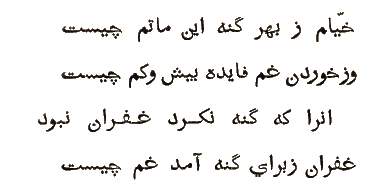Bodleian quatrain nr. 23

Bodenstedt 1881 - II.8
Was quälst Du Dich um Schuld, die längst geschah?
Ist Gnade doch nur für die Schuld'gen da.
Drum, wer sich rühmt, daß er vom Tugendpfade
Sich nie verirrt, der findet keine Gnade.
Cadell 1899 - 13
O Khayam! why for sin this sorrowing?
What gain its less or more, can any say?
On him who sins not, shines not mercy's ray.
Where then their harm, since sins God's mercy bring?
Garcin de Tassy 1858 - 3
Khayàm, pourquoi ce deuil pour tes fautes, et quel avantage trouves-tu à dévorer ton chagrin ?
Celui qui n'a pas péché n'a pas été non plus l'objet de l'absolution divine.
Le pardon est pour les fautes, pourquoi donc te livrer a la douleur?
Garner 1898 - 93
Why let thy sins of old torment thee so,
What gain to thee from all this crushing woe?
The man who God's commandment ne'er transgressed
Can ne'er God's all-forgiving kindness know.
Grolleau 1902 - 23
Kháyyám, pourquoi pleurer ainsi sur tes péchés?
Que gagnes-tu en te livrant à une telle tristesse?
Puisque la Miséricorde n'est pas pour les justes,
Et ne s'éveille qu'aux bruits de nos péchés, pourquoi gémir?
Heron-Allen 1898 - 23
Khayyám, why mourn thus for thy sins?
from grieving thus what advantage, more or less, dost thou gain?
Mercy was never for him who sins not,
mercy is granted for sins—why then grieve?
De Marthold 1910 - 23
Khayyâm, pourquoi pleurer ainsi sur tes péchés?
Gagnes-tu rien à voir tes pleurs jamais séchés?
Pas besoin de pardon pour qui fiit toujours juste
Et la pitié ne va qu'aux pécheurs débauchés?
McCarthy 1889 - 18
O KHAYAM, WHY SO MUCH MOURN-
ING FOR YOUR SIN? WHAT CONSOLA-
TION CAN YOU FIND IN THUS PLAGU-
ING YOURSELF? HE WHO HAS NEVER
SINNED CAN NEVER TASTE THE SWEET
OF FOREGIVENESS. MERCY WAS MADE
FOR THE SAKE OF SIN, THEREFORE,
WHY ARE YOU AFRAID?
Nicolas 1867 - 43
Khèyam! pourquoi tant de deuil pour un péché commis? Quel soulagement plus ou moins grand trouves-tu à te tourmenter ainsi? Celui qui n'a point péché ne jouira pas de la douceur du pardon. C'est pour le péché que le pardon existe; dans ce cas, quelle crainte peux-tu avoir?
Payne 1898 - 81
Why, Kheyyam, for sin this mourning and misgiving?
Marry, where's the good, more or less, of grieving?
'T is because of sin that forgiveness cometh;
If there were no sin, there were no forgiving.
Von der Porten 1927 - 23
Was grämst du dich ob deiner Sünden, o Chajjâm?
Ob durch dein Grämen jemals dir ein Vorteil kam?
Die Gnade ist für keinen, der da sündenlos -
Die Gnade ist für Sünden: Warum denn dein Gram?
Roe 1906 - 64
Khayyám,why drown thyself in sorrow here?
What though thy sins like ocean sands appear?
Mercy can reach thee, though it pass the pure;
'T is made for sinners, wherefore dost thou fear?
Rosen 1928 - 38
Khayyám,why drown thyself in sorrow here?
What though thy sins like ocean sands appear?
Mercy can reach thee, though it pass the pure;
'T is made for sinners, wherefore dost thou fear?
Von Schack 1878 - 94
Dieser Sünden wegen, Chijam, was in Kummer dich verzehrst du?
Ohne Nutzen dir zu schaffen, solchen Gram im Herzen nährst du?
Sündern nur läßt Gott die Wonne der Vergebung angedeih'n,
Und wenn keine Sünder wären, wem dann sollt' er wohl verzeih'n?
Talbot 1908 - 23
Khayyám! for all thy sins pray do not deign
To mourn; thy grief can earn thee naught but pain.
Mercy was made for Sinners. Why then grieve?
For they who sin not, Mercy may not gain.
Thompson 1906 - 87
Khayyam, O why for sin this grief and shame?
What gain in mourning thus yourself to blame?
He knows not gracious mercy who sins not.
Why grieve? It was for sin that mercy came.
Tirtha 1941 - XI.58
For sins, O Khayyam! why should you bewail?
This grief can bring no grain in bag or bale;
For mercy will not greet the spotless swell,
It graces sinful paupers.—Do not quail.
Whinfield 1883 - 46
Khayyam! why weep you that your life is bad?
What boots it thus to mourn? Rather be glad.
He that sins not can make no claim to mercy,
Mercy was made for sinners—be not sad.
- ARBERRY 1949 - 131
- ARBERRY 1952 - 168
- WHINFIELD 1882 - 24
